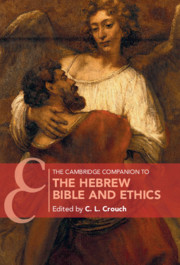Book contents
- The Cambridge Companion to the Hebrew Bible and Ethics
- Cambridge Companions to Religion
- The Cambridge Companion to the Hebrew Bible and Ethics
- Copyright page
- Dedication
- Contents
- Notes on Contributors
- Introduction
- Part I Legal Ethics
- Part II Narrative Ethics
- Part III Prophetic Ethics
- 11 Religion and Ethics in Isaiah
- 12 Covenant in the Book of Jeremiah
- 13 Ezekiel and Criminal Justice Reform
- 14 Poverty and Social Justice in Micah
- 15 War Violence in Hosea, Amos, and Nahum
- Part IV Wisdom/Poetic Ethics
- Part V Faithful Ethics
- Index
- Cambridge Companions to Religion (continued from page iii)
- References
13 - Ezekiel and Criminal Justice Reform
from Part III - Prophetic Ethics
Published online by Cambridge University Press: 05 February 2021
- The Cambridge Companion to the Hebrew Bible and Ethics
- Cambridge Companions to Religion
- The Cambridge Companion to the Hebrew Bible and Ethics
- Copyright page
- Dedication
- Contents
- Notes on Contributors
- Introduction
- Part I Legal Ethics
- Part II Narrative Ethics
- Part III Prophetic Ethics
- 11 Religion and Ethics in Isaiah
- 12 Covenant in the Book of Jeremiah
- 13 Ezekiel and Criminal Justice Reform
- 14 Poverty and Social Justice in Micah
- 15 War Violence in Hosea, Amos, and Nahum
- Part IV Wisdom/Poetic Ethics
- Part V Faithful Ethics
- Index
- Cambridge Companions to Religion (continued from page iii)
- References
Summary
Few Americans are aware that someone convicted of a crime in the United States emerges from the courtroom condemned to a lifetime of discrimination. Individuals with a criminal record are required to declare their conviction to prospective employers, who are overwhelmingly averse to hiring them, and to prospective landlords, who are averse to housing them. They are prohibited from practicing a wide range of professions, many of which bear no relation whatsoever to the crime they may have committed. They are barred from public housing and limited in their recourse to food stamps and other forms of government assistance, if not outright prohibited from it. These and other forms of systemic, legalized discrimination against individuals with criminal records means that the end of a prison sentence marks not the end of punishment, but only a transition to its next stage.
- Type
- Chapter
- Information
- The Cambridge Companion to the Hebrew Bible and Ethics , pp. 192 - 207Publisher: Cambridge University PressPrint publication year: 2021
References
Further Reading
- 1
- Cited by



